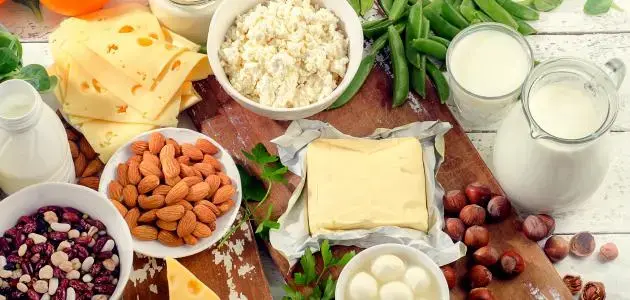Calcium-Rich Foods
There are plenty of both animal-based and plant-based sources of calcium out there. Here's a breakdown of where you can get your daily dose:
Dairy Products
Dairy products like milk and yogurt have been part of our diets for thousands of years. They’re not only great sources of calcium but also pack in potassium, vitamin B12, and vitamin D. Since yogurt is made from milk, it naturally contains calcium too—plus around 9 grams of protein per 170 grams.
- Cow’s milk: One cup has about 250 mg of calcium.
- Calcium-fortified plant milks: One cup offers around 200–250 mg.
- Yogurt: Three-quarters of a cup has roughly 250 mg of calcium.
Cheese
Cheese is another awesome calcium source, helping support strong bones, healthy teeth, and normal blood pressure. Here’s how some cheeses stack up:
- Low-fat mozzarella: 42.5g = 333 mg
- Cheddar: 42.5g = 307 mg
- Low-fat cottage cheese: 226g = 138 mg
- Cream cheese: 1 tablespoon = 14 mg
Fish
Fish like sardines and canned salmon are great sources of calcium, especially if you eat the bones.
- Sardines (85g canned in oil): 324 mg (32% DV)
- Salmon (85g canned): 181 mg (18% DV)
Sweet Potatoes
One sweet potato gives you about 55 mg of calcium, and a cup of cooked sweet potato offers around 76 mg. Add a little yogurt or cheese to boost the calcium even more.
Nuts & Seeds
Most nuts and seeds offer some calcium, along with healthy fats, fiber, and protein. Here are a few standouts:
- Almonds (35g): 97 mg (10% DV)
- Brazil nuts (35g): 6% DV
- Sesame seed tahini (2 tbsp): 130 mg (13% DV)
- Chia or flax seeds (20–25g): 5–6% DV
- Other nuts (walnuts, pistachios, hazelnuts, macadamias): 2–3% DV per 35g
Legumes
Beans and legumes are another solid source of calcium:
- Cooked white beans (1 cup): 130 mg
- Canned white beans (1 cup): 190 mg
- Canned chickpeas (1 cup): 80 mg
Leafy Greens & Veggies
Dark leafy greens and cruciferous veggies are packed with calcium that your body can absorb fairly easily. Cooking them can even reduce oxalates that block absorption.
- Spinach, bok choy, mustard greens, turnip greens (½ cup cooked): 84–142 mg (8–14% DV)
- Okra, kale, broccoli, cabbage, Brussels sprouts (½ cup cooked): 3–6% DV
Fortified Foods
Many common foods are fortified with calcium during processing. Here are a few examples:
- Fortified milk alternatives (almond, rice milk, etc.): ~300 mg per cup
- Fortified orange juice (1 cup): ~300 mg
- Calcium-set tofu (113g): ~205 mg
- Fortified oatmeal (1 packet): ~140 mg
- Fortified breakfast cereals (1 cup): 100–1000 mg
More Calcium-Rich Foods
Here’s a quick look at calcium content in some everyday foods:
- Whole milk (1 cup): 276 mg (21% DV)
- Low-fat milk (1 cup): 293 mg (23% DV)
- Fat-free milk (1 cup): 299 mg (23% DV)
- Calcium-fortified soy milk (1 cup): 299 mg (23% DV)
- Low-fat fruit yogurt (177 ml): 258 mg (20% DV)
- Frozen yogurt (½ cup): 103 mg (8% DV)
- Ice cream (½ cup): 84 mg (6% DV)
- Whole wheat bread (1 slice): 30 mg (2% DV)
- White bread (1 slice): 73 mg (6% DV)
- Corn tortilla (1 slice): 46 mg (4% DV)
Calcium Supplements
Always check with your doctor before taking calcium supplements. They’ll help you weigh the benefits vs. any risks. Here are a few types:
- Calcium carbonate: Often found in antacids; affordable and high in calcium (200 mg or more per pill).
- Calcium citrate: Easier to absorb, especially for older adults or people with low stomach acid.
- Other forms: Like calcium gluconate, lactate, or phosphate—contain smaller amounts.
Why Calcium Matters
Calcium plays a key role in building strong bones and teeth, supporting heart health, helping muscles contract, and aiding in blood clotting.
Fruits with Calcium
If you’re plant-based, don’t worry—some fruits do contain calcium. Here are a few:
- Fortified orange juice (1 cup): 349 mg (27% DV)
- Prickly pear (1 cup): 83 mg (6% DV)
- Mandarins (1 cup): 72 mg (6% DV)
- Kiwi (1 cup): 61 mg (5% DV)
- Blueberries (1 cup): 55 mg (4% DV)
- Blackberries (1 cup): 42 mg (3% DV)
- Guava (1 cup): 30 mg (2% DV)
- Papaya (1 cup): 29 mg (2% DV)
- Passionfruit (1 cup): 28 mg (2% DV)
- Apple (120g): 6 mg
- Banana (150g): 12 mg
- Apricot (120g): 19 mg
- Raisins (40g): 31 mg
- Dried currants (120g): 72 mg
- Dried figs (1 cup): 241 mg
Calcium-Boosting Herbs
While not many herbs are super high in calcium, a few help your body absorb it better:
- Horsetail: High in silicon and antioxidants, it helps with calcium absorption and bone strength.
- Nettle: A good source of calcium.
- Dandelion greens: Rich in calcium
Leave a comment
Your email address will not be published. Required fields are marked *




